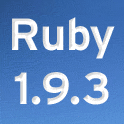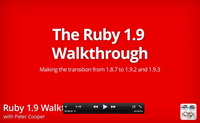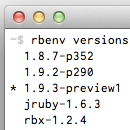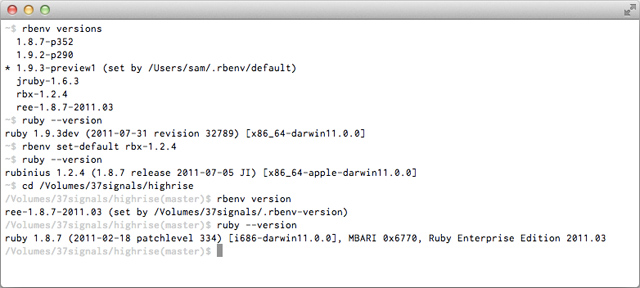 Ruby Inside wouldn’t be what it is without you but it’s time for me to thank the companies who also help to keep Ruby Inside going by sponsoring my work. Thanks!
Ruby Inside wouldn’t be what it is without you but it’s time for me to thank the companies who also help to keep Ruby Inside going by sponsoring my work. Thanks!
I take care not to accept sponsors who have little of interest to the Ruby scene so hopefully you’ll find something useful below – it’s not a roster of faceless companies, these folks are doing great stuff.
Gauges – Simple, Sexy Real-time Analytics
 Gauges is a tool for collecting and analyzing the Web traffic for all your sites in real-time using a fast, reliable, hosted system. You can even see overview data for all your sites on a single page. Read More
Gauges is a tool for collecting and analyzing the Web traffic for all your sites in real-time using a fast, reliable, hosted system. You can even see overview data for all your sites on a single page. Read More







 On August 1, 2011,
On August 1, 2011, 
 Despite
Despite  It seems the Ruby and Rails job scenes are on fire! I don’t remember running so many jobs across a single month before. 22 Ruby and Rails jobs are here and they’re spanning the world. US West Coast, East Coast, England, Scotland and Germany are all represented. It’s definitely not the common “San Francisco or nothing” roundup :-)
It seems the Ruby and Rails job scenes are on fire! I don’t remember running so many jobs across a single month before. 22 Ruby and Rails jobs are here and they’re spanning the world. US West Coast, East Coast, England, Scotland and Germany are all represented. It’s definitely not the common “San Francisco or nothing” roundup :-)

 Between August 19—20, 2011, Madison, Wisconsin plays host to thirty-seven speakers and panelists to discuss Ruby, OSS, and community in the form of
Between August 19—20, 2011, Madison, Wisconsin plays host to thirty-seven speakers and panelists to discuss Ruby, OSS, and community in the form of  In the past couple of months I’ve seen situations arise where developers aren’t entirely sure how Ruby has chosen to interpret their code. Luckily, Ruby 1.9 comes with a built-in library called Ripper that can help solve the problem (there’s a 1.8 version too, see later). Here, I give the 30 second rundown on what to do.
In the past couple of months I’ve seen situations arise where developers aren’t entirely sure how Ruby has chosen to interpret their code. Luckily, Ruby 1.9 comes with a built-in library called Ripper that can help solve the problem (there’s a 1.8 version too, see later). Here, I give the 30 second rundown on what to do. Official project sites should set the benchmark for standards relating to that project in terms of the best quality and most up to date news updates, documentation, download links, tutorials, and so forth. On this front, Ruby’s official site at
Official project sites should set the benchmark for standards relating to that project in terms of the best quality and most up to date news updates, documentation, download links, tutorials, and so forth. On this front, Ruby’s official site at 
 Over on the
Over on the  I don’t like being negative on Ruby Inside without good reason. Trivia like
I don’t like being negative on Ruby Inside without good reason. Trivia like  Over at the always-riveting official Ruby blog, Shota Fukumori
Over at the always-riveting official Ruby blog, Shota Fukumori  The Ruby and Rails job scene continues to grow through 2011 and we’ve got *drumroll* 13 (lucky for some) jobs to share from the
The Ruby and Rails job scene continues to grow through 2011 and we’ve got *drumroll* 13 (lucky for some) jobs to share from the  Amazon has unveiled
Amazon has unveiled 